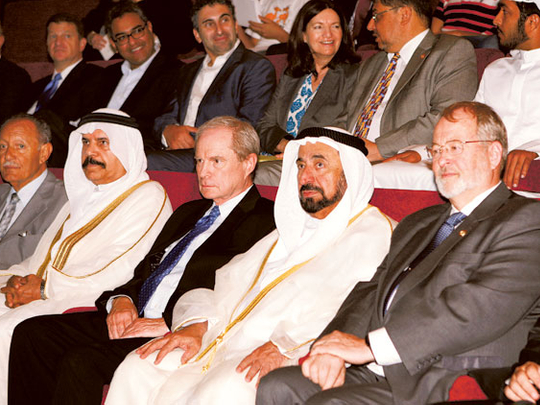
Dubai: The various evolutionary developments that scholars and historians are continually doing to digitally preserve Islamic heritage was highlighted on Wednesday at an international symposium in Sharjah.
His Highness Dr Shaikh Sultan Bin Mohammad Al Qasimi, Member of the Supreme Council and Ruler of Sharjah, opened the event titled “Islamic Civilisation in the 21st Century: Global Perspectives” hosted by Sharjah Museums Department in partnership with the American University of Sharjah (AUS).
A number of leaders from the educational, cultural, scientific and artistic sectors, recognised within the Islamic world and internationally, were invited to participate in the event.
The event was organised as a contribution to Sharjah’s celebrations as Capital of Islamic Culture 2014 and shed light on the various contributions that some experts from different fields have made.
Leading the first session, Dr Meis Al Kaisi, an assistant professor in the Arabic and translation department at AUS, said: “We are here to raise awareness of the legacy and continuity of the Islamic civilisation in the 21st century. Islamic manuscripts, artefacts, including exhibitions. In the past we had to travel miles to access these but they are now delivered virtually and directly to people who are interested in the treasures of the past with just a click of a mouse.”
Yasmine Faghihi, head of the Near and Middle Eastern Department at Cambridge University, opened the session by talking about the major projects by Cambridge University.
As one of the board of directors of the FIHRIST project, which is the first online union catalogue of Islamic manuscripts in the UK, she says Cambridge University has played a major role in the collection of Islamic manuscripts and in making “these materials accessible to the world”.
“Collection of different Islamic manuscripts and Arabic books by scholars began at Cambridge University in the 18th century. The manuscripts were scattered because they were sold separately. We have many fragments of Mushafs [sections of the Quran which were compiled later] but they don’t tell a full story, but now through digitisation and digital means, we were able to reunite the manuscripts by creating a union catalogue with the help of 12 libraries who have helped attach to it,” Faghihi said.
Faghihi also briefed the audience about the Cambridge Digital Library which is a portal for images, data and research that allows anyone to access original data, such as Mushaf texts and their transcriptions.
Following Faghili was Eva Schubert, the initiator and founder of the Museum With No Frontiers (MWNF), who spoke about the trans-national museum which was launched in 1994 as a project which was aimed at putting the spotlight on Islamic heritage.
Schubert said that the number one aim of this project was “to change the negative perception of the Islamic society outside the Arab world and to promote a different understanding of Islamic history and heritage”.
“In order to achieve a real understanding, we present history from a shared perspective from each country. The museum became a platform where experts from Europe and the Arab world are working together. As part of our project, we have created a network of local publishers to produce books and guidebooks which are all well researched,” she said.
Schubert added each country selects a topic meaningful to its Islamic identity and this in return promotes tourism because it invites people to visit these countries to see the remains of Islamic civilization.
The other virtual project she mentioned was discovered in 2004 in collaboration with 14 countries. The project called ‘Discover Islamic Art’ is a large online museum dedicated to Islamic art with a database of 2,385 artefacts, monuments and archaeological sites that operates like a real exhibition.











